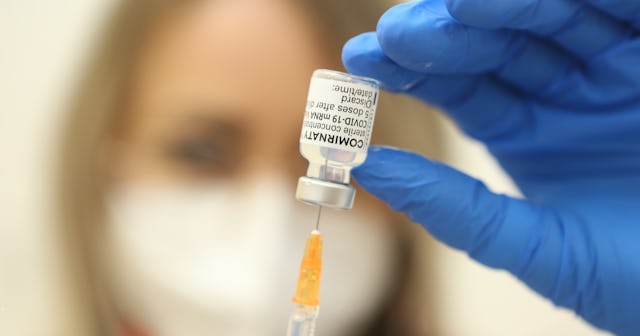CDC Director Says U.S Is Ready If COVID Vaccine Is Seasonal Like Flu Shot

As the number of fully vaccinated Americans grows into the hundreds of millions, the CDC looks ahead to future safeguards against the virus
COVID-19 variants have been spreading and experts are now preparing for the point when existing vaccines may be insufficient to protect against them. This is why scientists at the CDC are investigating the likelihood of a COVID-19 vaccine booster designed to safeguard against potential variants and CDC director Rochelle Walensky says to prepare for the possibility that we could be taking the COVID-19 vaccine seasonally, like the flu shot.
“We are doing the studies on boosters to see if we will need them, and that is six months, one year, two years — we don’t really know,” director of the CDC Rochelle Walensky told Jennifer Garner in an official CDC Instagram Live on Friday, May 7, 2021 (via CNN). “But we want to be prepared for them should we need them.”
If the U.S. does need booster shots to fight COVID-19, officials have processes already in place to get them out.
“The vision would be that we would do it in the same way that we do the flu vaccine,” Walensky said. “We hope we don’t have to do it every season, but we’re preparing in case we do.”
According to a story in The New York Times, the pharma companies using the mRNA platform in their vaccines are able to produce newer vaccines within weeks. Moderna began modifying its vaccine to combat the variant identified in South Africa after reports emerged that the existing vaccines are slightly less effective against that variant.
An early clinical trial by Moderna shows that a booster shot of its COVID-19 vaccine had a promising effect against the B.1.351 and P.1 strains, CNBC reported on Wednesday, citing the pharmaceutical company’s findings from an ongoing study.
In its clinical trial, Moderna is examining the response to a 50-microgram booster dose of its vaccine in previously vaccinated people. The research found that booster shots caused antibodies to increase against both the original virus and the two variants which have since spread to other countries, including the U.S. They say that a booster shot of their other vaccine, which they call mRNA-1273.351, generated a better immune response to B.1.351 than its current vaccine. This is a variant-specific booster shot meant to target B.1.351.
The preliminary results, which Moderna says will be published online, have not yet been peer-reviewed.
If we need boosters, some scientists think it won’t matter if you mix and match your vaccines.
The San Francisco Chronicle interviewed Monica Gandhi, an infectious disease expert at the University of California San Francisco about taking vaccines from different pharma companies.
“We as practicing physicians don’t look at the brand name of the vaccine when we give boosters in the real world,” Gandhi told the media outlet. “Moreover, there is evidence that mixing and matching different vaccines may actually boost the immune response to COVID-19, and this strategy is being tested right now in the U.K.”
The California media outlet also interviewed Robert Siegel, professor of virology and immunology at Stanford University, about mixing and matching doses for a booster.
“It is not yet time for the public to start worrying about what booster to get,” Siegel told the paper. “When the time comes, there is little reason to believe there will be a significant difference between Pfizer and Moderna.”
At the moment, all this booster shot news boils down to is expectation management. Research on booster doses is currently underway, and we have yet to receive CDC guidance on when or how one needs to acquire their dose. The CDC director’s newest interview would ideally help you start mentally preparing for the fact that the COVID-19 vaccine may be just as painless and routine as getting your annual flu shot.